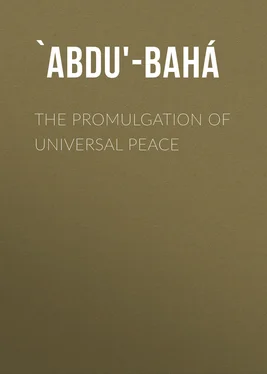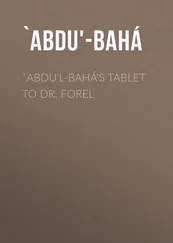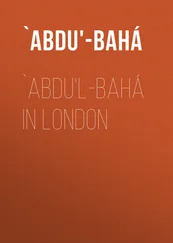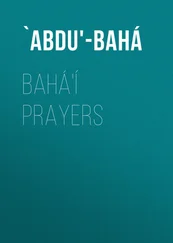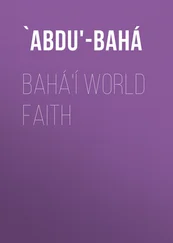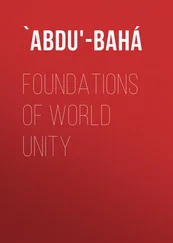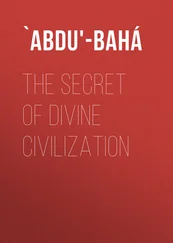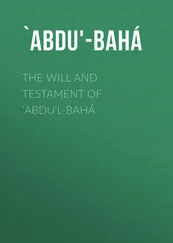`Abdu'-Bahá - The Promulgation of Universal Peace
Здесь есть возможность читать онлайн «`Abdu'-Bahá - The Promulgation of Universal Peace» — ознакомительный отрывок электронной книги совершенно бесплатно, а после прочтения отрывка купить полную версию. В некоторых случаях можно слушать аудио, скачать через торрент в формате fb2 и присутствует краткое содержание. Издательство: Иностранный паблик, Жанр: foreign_prose, foreign_religion, Философия, Ужасы и Мистика, foreign_psychology, на английском языке. Описание произведения, (предисловие) а так же отзывы посетителей доступны на портале библиотеки ЛибКат.
- Название:The Promulgation of Universal Peace
- Автор:
- Издательство:Иностранный паблик
- Жанр:
- Год:неизвестен
- ISBN:нет данных
- Рейтинг книги:4 / 5. Голосов: 1
-
Избранное:Добавить в избранное
- Отзывы:
-
Ваша оценка:
- 80
- 1
- 2
- 3
- 4
- 5
The Promulgation of Universal Peace: краткое содержание, описание и аннотация
Предлагаем к чтению аннотацию, описание, краткое содержание или предисловие (зависит от того, что написал сам автор книги «The Promulgation of Universal Peace»). Если вы не нашли необходимую информацию о книге — напишите в комментариях, мы постараемся отыскать её.
The Promulgation of Universal Peace — читать онлайн ознакомительный отрывок
Ниже представлен текст книги, разбитый по страницам. Система сохранения места последней прочитанной страницы, позволяет с удобством читать онлайн бесплатно книгу «The Promulgation of Universal Peace», без необходимости каждый раз заново искать на чём Вы остановились. Поставьте закладку, и сможете в любой момент перейти на страницу, на которой закончили чтение.
Интервал:
Закладка:
The questions asked us have been opportune and to the point. Our answers have not been utilized for controversy and argument. We met savants and learned men and satisfied them with our explanations. Important people expressed their satisfaction and pleasure at our replies to their inquiries. In brief, it would be difficult to find in the aggregate of people we met anyone who was dissatisfied. Some scholastic minds aimed only at fruitless discussion. In Chicago we met two clergymen—delivering an address at the church of one and having dinner with the other. Both manifested great love. Likewise, among all the people we met, not a single soul arose in opposition or went away disappointed.
Yesterday in Washington we met a group of important people. One prominent in political circles came with a justice of the Supreme Court. There were many ladies of the diplomatic circle present. After we had spoken, the politician referred to raised the point that the foundation of all religions from time immemorial had been peace, love and accord—principles conducive to fellowship and unification—yet Jesus, he declared, had been “the cause of discord and strife and not a factor in the realization of unity.” “Therefore,” he said, “I cannot accept your statements and explanations that religion has been the source of human betterment.” After we explained further he said, “What you have stated may cause me to change my views and agree with you.” During this time the justice remained silent. Fearing he might have some feeling of dissatisfaction, we asked if anything presented had been objectionable to his opinion. He replied, “Not at all! Not at all! It’s all right! It’s all right!” This is the characteristic expression of the Occident—“All right! All right!”
There were also present at this meeting several cabinet officers, United States senators, many from the foreign diplomatic service, army and navy officials and other dignitaries. The servant of God, our hostess, experienced much trouble in preparation and entertainment but was always active and energetic in service, inviting important and influential people to the gatherings. We spoke to all from their own standpoints with most satisfactory results; we were working day and night so there was very little time for individual and private interviews.
In Washington, too, we called a meeting of the blacks and whites. The attendance was very large, the blacks predominating. At our second gathering this was reversed, but at the third meeting we were unable to say which color predominated. These meetings were a great practical lesson upon the unity of colors and races in the Bahá’í teaching.
We said in part: The black man must ever be grateful to the white man, for he has manifested great courage and self-sacrifice in behalf of the black race. Four years he fought their cause, enduring severe hardships, sacrificing life, family, treasure, all for his black brother until the great war ended in the proclamation of freedom. By this effort and accomplishment the black race throughout the world was influenced and benefited. Had this not been accomplished, the black man in Africa would still be bound by the chains of slavery. Therefore, his race should everywhere be grateful, for no greater evidence of humanism and courageous devotion could be shown than the white man has displayed. If the blacks of the United States forget this sacrifice, zeal and manhood on the part of the whites, no ingratitude could be greater or more censurable. If they could see the wretched conditions and surroundings of the black people of Africa today, the contrast would be apparent and the fact clearly evident that the black race in America enjoys incomparable advantages. The comfort and civilization under which they live here are due to the white man’s effort and sacrifice. Had this sacrifice not been made, they would still be in the bonds and chains of slavery, scarcely lifted out of an aboriginal condition. Therefore, always show forth your gratitude to the white man. Eventually all differences will disappear, and you will completely win his friendship.
God maketh no distinction between the white and the black. If the hearts are pure both are acceptable unto Him. God is no respecter of persons on account of either color or race. All colors are acceptable to Him, be they white, black, or yellow. Inasmuch as all were created in the image of God, we must bring ourselves to realize that all embody divine possibilities. If you go into a garden and find all the flowers alike in form, species and color, the effect is wearisome to the eye. The garden is more beautiful when the flowers are many-colored and different; the variety lends charm and adornment. In a flock of doves some are white, some black, red, blue; yet they make no distinction among themselves. All are doves no matter what the color.
This variety in forms and colorings which is manifest in all the kingdoms is according to creative wisdom and has a divine purpose. Nevertheless, whether the creatures be all alike or all different should not be the cause of strife and quarreling among them. Especially why should man find cause for discord in the color or race of his fellow creature? No educated or illumined mind will allow that this differentiation and discord should exist or that there is any ground for it. Therefore, the whites should be just and kind to the blacks, who in turn should reflect an equal measure of appreciation and gratitude. Then will the world become as one great garden of flowering humanity, variegated and multicolored, rivaling each other only in the virtues and graces which are spiritual.
12 May 1912
Talk at Unity Church
Montclair, New Jersey
I wish to speak upon the subject of divine unity, the oneness of God, before this revered assemblage.
It is a self-evident fact that phenomenal existence can never grasp nor comprehend the ancient and essential Reality. Utter weakness cannot understand absolute strength. When we view the world of creation, we discover differences in degree which make it impossible for the lower to comprehend the higher. For example, the mineral kingdom, no matter how much it may advance, can never comprehend the phenomena of the vegetable kingdom. Whatever development the vegetable may attain, it can have no message from nor come in touch with the kingdom of the animal. However perfect may be the growth of a tree, it cannot realize the sensation of sight, hearing, smell, taste and touch; these are beyond its limitation. Although it is the possessor of existence in the world of creation, a tree, nevertheless, has no knowledge of the superior degree of the animal kingdom. Likewise, no matter how great the advancement of the animal, it can have no idea of the human plane, no knowledge of intellect and spirit. Difference in degree is an obstacle to this comprehension. A lower degree cannot comprehend a higher although all are in the same world of creation—whether mineral, vegetable or animal. Degree is the barrier and limitation. In the human plane of existence we can say we have knowledge of a vegetable, its qualities and product; but the vegetable has no knowledge or comprehension whatever of us. No matter how near perfection this rose may advance in its own sphere, it can never possess hearing and sight. Inasmuch as in the creational world, which is phenomenal, difference of degree is an obstacle or hindrance to comprehension, how can the human being, which is a created exigency, comprehend the ancient divine Reality, which is essential? This is impossible because the reality of Divinity is sanctified beyond the comprehension of the created being, man.
Furthermore, that which man can grasp is finite to man, and man to it is as infinite. Is it possible then for the reality of Divinity to be finite and the human creature infinite? On the contrary, the reverse is true; the human is finite while the essence of Divinity is infinite. Whatever comes within the sphere of human comprehension must be limited and finite. As the essence of Divinity transcends the comprehension of man, therefore God brings forth certain Manifestations of the divine Reality upon Whom He bestows heavenly effulgences in order that They may be intermediaries between humanity and Himself. These holy Manifestations or Prophets of God are as mirrors which have acquired illumination from the Sun of Truth, but the Sun does not descend from its high zenith and does not effect entrance within the mirror. In truth, this mirror has attained complete polish and purity until the utmost capacity of reflection has been developed in it; therefore, the Sun of Reality with its fullest effulgence and splendor is revealed therein. These mirrors are earthly, whereas the reality of Divinity is in its highest apogee. Although its lights are shining and its heat is manifest in them, although these mirrors are telling their story of its effulgence, the Sun, nevertheless, remains in its own lofty station; it does not descend; it does not effect entrance, because it is holy and sanctified.
Читать дальшеИнтервал:
Закладка:
Похожие книги на «The Promulgation of Universal Peace»
Представляем Вашему вниманию похожие книги на «The Promulgation of Universal Peace» списком для выбора. Мы отобрали схожую по названию и смыслу литературу в надежде предоставить читателям больше вариантов отыскать новые, интересные, ещё непрочитанные произведения.
Обсуждение, отзывы о книге «The Promulgation of Universal Peace» и просто собственные мнения читателей. Оставьте ваши комментарии, напишите, что Вы думаете о произведении, его смысле или главных героях. Укажите что конкретно понравилось, а что нет, и почему Вы так считаете.
